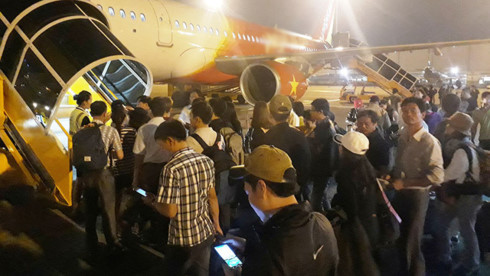Airfares in Vietnam unlikely to drop despite growing competition
- Vietnam exempts import tax for Emirates Airline
- Travelers name Vietnam Airlines among best carriers in Asia
The country’s only four locally owned airlines – Vietnam Airlines, VietJet Air, Jetstar Pacific and VASCO – are handling domestic air travel demands for its booming population of over 92 million.
In essence, it is a two-horse race between privately-owned VietJet and national flag carrier Vietnam Airlines, as the latter holds the majority stake at both VASCO and Jetstar Pacific.
With such potential for growth, a number of Vietnamese enterprises have applied to open their own airlines, hoping for a successful entrance into the ludicrous market.
 |
In April, local conglomerate FLC Group announced that their own airline brand, Bamboo Airways, would be ready to conduct its maiden flight in the fourth quarter of 2018 despite not having received a license from authorities as of June.
The airline has already recruited a former Vietnam Airlines deputy general director to take charge as its top leader, and is looking to hire 92 pilots and 250 flight attendants.
According to a Bamboo Airways representative, it looks to brand itself as a ‘hybrid’ airline, offering air travel experience at a lower cost than full-service airlines but not cheaper than budget airlines.
Meanwhile, the picture looks gloomier for other airlines looking to earn their share of the market.
Globaltrans Air, a potential Vietnamese airline with VND100 billion (US$4.4 million) in charter capital, had its aviation business license revoked in November 2016 after failing to conduct any commercial flight for 18 months since receiving the license as per Vietnamese laws.
Vietstar Airlines had plans to launch commercial flights in early 2016 but has faced hurdles in applying for aviation business license due to overloading at Tan Son Nhat International Airport, where the airline plans to place its hub.
Asia’s top budget airline AirAsia is also looking to partner with Vietnamese hospitality group Thien Minh to found a new low-cost airline in Vietnam, but the plan has not moved forward as of 2018.
Lower airfares unlikely
Nguyen Thanh Trung, an experienced commercial pilot, thinks passengers will be presented with more options when new airlines are introduced to the market, but considers it too soon to expect substantial changes airfare-wise.
“Of course there will be some sort of reduction [in airfares], but it will be moderate at most,” he said.
This is especially true considering the fact that a large part of airfares are made up of airport service charges and other surcharges rather than the price of the ticket itself.
In April, local carriers and airports announced that they would start applying higher rates to a number of services.
From April 1 to June 30, airport service charges at multiple airdromes, including Tan Son Nhat in Ho Chi Minh City, Noi Bai in Hanoi, Da Nang in the namesake central city, and others, will also rise from VND80,000 (US$3.5) to VND85,000 (US$4).
The fee will become VND100,000 (US$4.5) from July 1, in accordance with a plan set up by the Ministry of Transport.
Passenger and Baggage Security Screening Service Charges will also increase from VND12,000 (US$0.5) to VND16,000 (US$0.7) from April 1.
This was the second time that local airports had adjusted their service charges in 2018.

